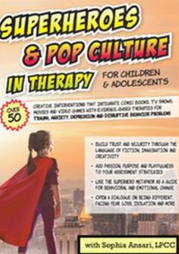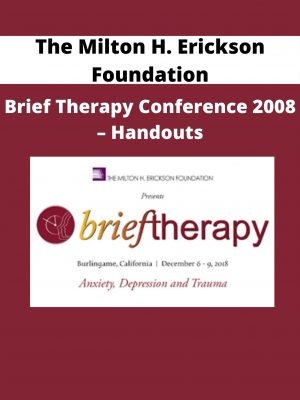Sophia Ansari – Superheroes and Pop Culture in Therapy for Children and Adolescents
$219 Original price was: $219.$62Current price is: $62.
Shopping Instructions:
- DISCOUNT 15% : SHOP15
- Product Delivery: Within 1 – 12 hours after purchase.
Perhaps the notion isn’t as unbelievable as it seems. Like many children, our best-known superheroes are often impacted by abuse, divorce, loss, isolation, anger and their accompanying mental health challenges.
Sophia Ansari – Superheroes and Pop Culture in Therapy for Children and Adolescents
Why Superheroes? Clinically Relevant Themes in Comic books, Movies and TV Shows
- The rise of superheroes in therapy
- ”Geek Therapy” and geek culture
- The latest research on geek therapy in mental health
- Therapeutic alliance: Build trust, security, and vocabulary through their interests
Assessment Tools: Harnessing the “Superpowers” of Passion, Purpose and Playfulness
- Exploratory questions
- Strengths-spotting survey and activities
- Promote engagement with “Fantasy” exercises
- Draw a superhero to assess coping strategies
- Identify resources and obstacles with superhero gadget interventions
- The sidekick intervention – identify advocates in kid’s lives
Treat Trauma through the Filter of Comic Books
- Modalities – CBT, Bibliotherapy, Play Therapy, ACT and more
- Comic books and trauma narratives – help clients share trauma
- Choosing the appropriate story for the situation
- Talking about trauma through the filter of comics
- Trigger identification and coping skills exercises
- The Bat Signal/Utility Belt exercise
- Moving stories technique – Sandtray play
Help Kids and Adolescents Face Anxiety Like a Superhero
- Modalities – CBT, ACT, Exposure Therapy and Behavior Therapy
- Labeling our villains – help kids understand how anxiety is affecting their lives
- Build your clients readiness to face their worries and fears
- Create a safe distance from fears
- Heroes have dysfunctional behavior and cognitive distortions too
- Relating anxiety reduction techniques to superheroes
- Improve self-esteem and decrease anxiety with Spiderman
- Guided imagery with the Batmobile
Depression: Manage Change, Conflict and Grief After Loss
- Modalities – Interpersonal Psychotherapy, CBT, ACT, Bibliotherapy
- How relatable characters and situations from fantasy can be incorporated into therapy for clients facing:
- Social isolation
- Conflicts in relationships
- Change/relocation
- Grief after loss
- Superhero mindfulness techniques for self-compassion
- Harry Potter in the treatment of grieving children and adolescents
Disruptive Behavior Problems: Strategies to Reduce Disruptive Behavior Using Action Figures, TV Shows and More
- Modalities – Behavior Therapy, Play Therapy
- Facilitate self-awareness through “personal archetypes”
- Goal setting with the “superhero journey” metaphor
- Use the Hulk in play therapy to teach behavior management skills
- Level Up – how to use gaming metaphors in goal evaluation
- Directive and non-directive play strategies to promote positive behavioral change
Would you like to receive Sophia Ansari – Superheroes and Pop Culture in Therapy for Children and Adolescents ?
Description:
Imagine if kids and adolescents had superpowers to help them overcome their mental health issues. What would their superpowers be? How would you help them use these powers?
Perhaps the notion isn’t as unbelievable as it seems. Like many children, our best-known superheroes are often impacted by abuse, divorce, loss, isolation, anger and their accompanying mental health challenges. And like many superheroes, kids who struggle with psychological issues can often harness incredible inner strength. Your clients’ “powers” may already lay inside of them waiting to be discovered.
This recording will teach you to find your clients strengths, cultivate and enhance their inner resources, build on their best qualities, improve their resiliency, and help them change their worldview with a fun and engaging therapeutic approach centered around superhero mythology and popular culture!
Learn specific strategies to incorporate the superhero metaphor and the power of story-telling into evidence-based modalities of treatment including: play therapy, Cognitive Behavioral Therapy, Acceptance and Commitment Therapy, Behavior Therapy, Interpersonal Psychotherapy and Bibliotherapy. Hands on guidance will give you the tools you need to bring about self-awareness and change with kids facing trauma, anxiety, depression and disruptive behavior problems.
Benefits of Watching:
- Build trust, security, and emotional vocabulary through the language of superheroes
- Techniques to promote engagement in the therapeutic process
- Assessment strategies that help kids identify their strengths and recognize the advocates in their lives
- Interventions that offer clients a safe psychological distance from traumatic events
- A framework that encourages young people to open-up about their problems
- Creative tools for direct and indirect teaching
Related products
HEALTH & MEDICAL
HEALTH & MEDICAL
HEALTH & MEDICAL
KettleWorX – 8 Week Rapid Evolution Advanced Set with Alex Isaly
HEALTH & MEDICAL
HEALTH & MEDICAL
HEALTH & MEDICAL












